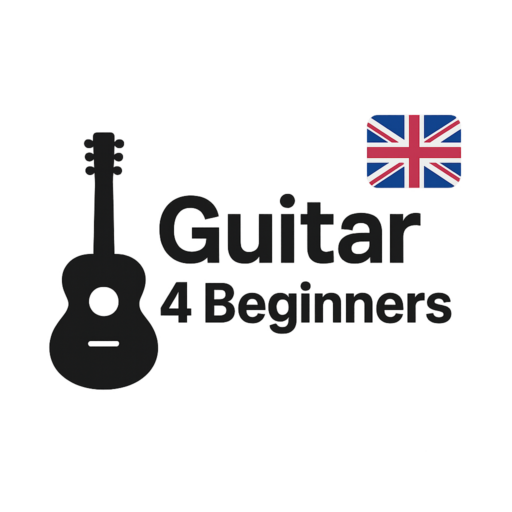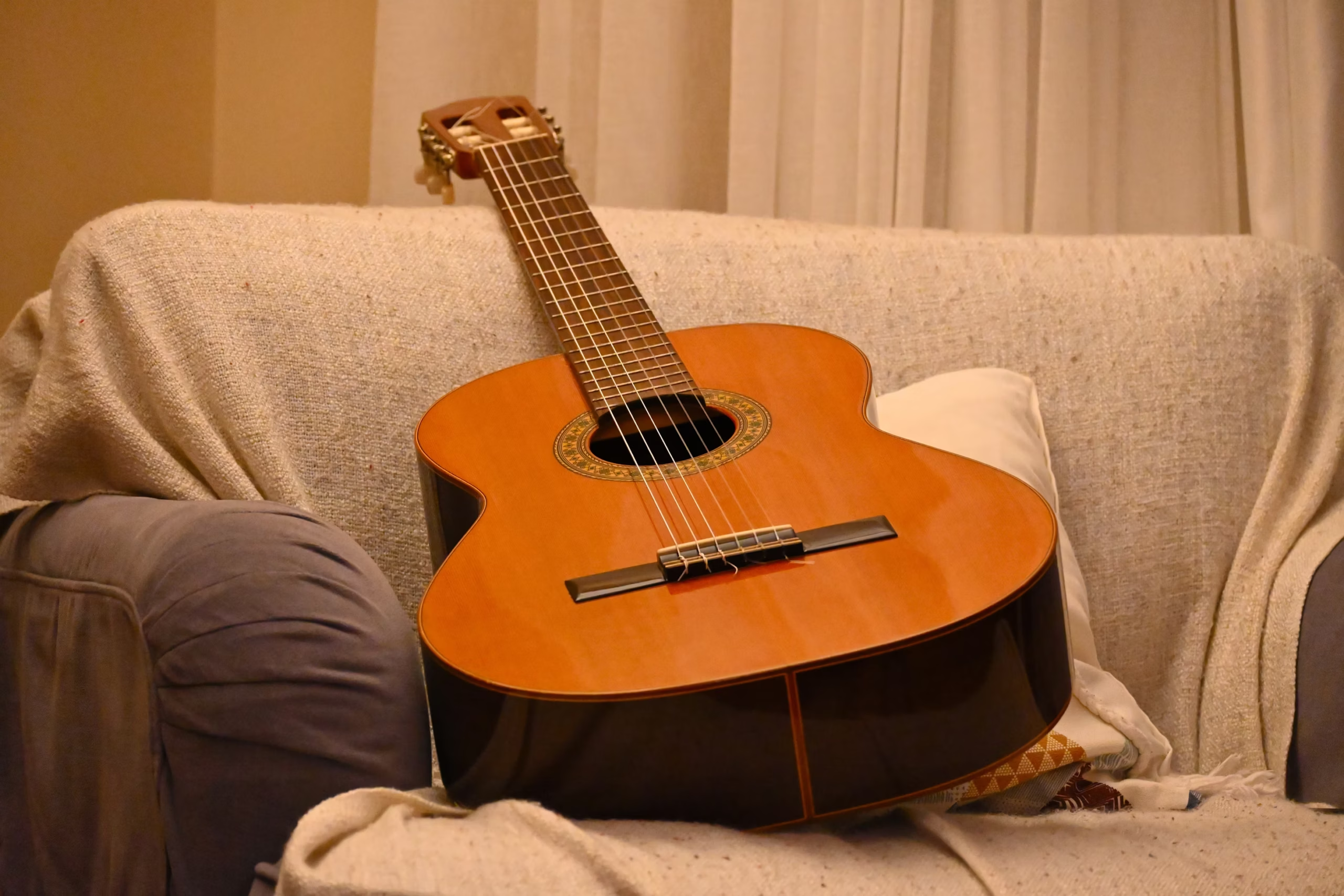If you’re thinking about picking up a guitar, you might be wondering: is learning guitar easy? Well, the answer is a bit of a mix. It can be challenging at first, but I think most beginners will be pleasantly surprised by how quick you can learn and play a short and simple tune. Let’s break down what makes learning guitar a bit tricky—and how you can make it easier on yourself as a beginner.

Can anyone learn the guitar?
Absolutely! Guitar is one of the most accessible instruments to learn, no matter your age or experience level. While it might take some time to get the hang of things, anyone can pick it up with a bit of practice and patience. The key is to stick with it and enjoy the process—it’s not about being perfect, it’s about having fun and making progress at your own pace.
That said, there are a few factors that can impact the speed at which you learn:
- Your Starting Point:
If you’ve never played an instrument before, learning guitar might feel unfamiliar. However, if you have some musical background, you may find it easier to pick up. - Acoustic vs. Electric Guitar:
Acoustic guitars tend to have thicker strings, which can make pressing down on chords a bit harder. On the other hand, electric guitars have lighter strings and may be easier for beginners. Not sure which to choose? Check out our guide: Acoustic or Electric Guitar for Beginners: Which One is Right for You? - Practice Time:
Consistency is one of the most important factors in progressing on the guitar. It’s far more effective to practice for 20–30 minutes a day than to cram in one long, irregular practice session each week. Short, regular practice sessions help build muscle memory and reinforce what you’ve learned. - Your Goals:
If your goal is to play simple chords and strum along to songs, you can achieve that relatively quickly. However, if you aim to master advanced techniques like fingerpicking or complex solos, you’ll need more patience and persistence. - Hand Shapes Vary, But You Can Still Play:
Everyone’s hands are different in size and shape, and that’s totally okay! While some may find it trickier to reach certain chords or bar strings, with practice, you’ll develop your own playing style. There are plenty of tips and techniques to help all hand shapes, so don’t worry—your hands won’t hold you back!
How to Make Learning Guitar Easier
To help you learn faster and avoid frustration, here are some tips to get you started:
- Start with the Basics:
Begin by learning easy open chords like G, C, D, and E minor. These chords are used in so many songs and form the foundation of your playing. My top recommendation for beginners is Justin Guitar—he has amazing videos and an app that break down the basics step-by-step. Take it slow, learn one chord at a time and get used to swapping between them. There are lots of amazing songs built around just a few simple chords so this is a great way to progress to playing songs quickly. - Learn Simple Riffs:
Start with simple one-string riffs. They are easy to play, help you get comfortable with the guitar, and are a lot of fun to practice. Plus, they can serve as a foundation for more complex riffs down the road. - Use Online Resources:
There are plenty of free tutorials, apps, and courses to help you. Justin Guitar is a personal favourite, but explore other platforms to find what clicks for you, Andy Guitar & Marty Schwartz are also both very popular! - Play Songs You Love:
Learning songs you enjoy can keep you motivated. While online courses often assign songs you may not be familiar with, practicing your favourite tunes is both fun and rewarding. It’s a great way to stay engaged with the process. For example if you love Oasis or Arctic Monkeys, there are plenty of easy songs you could learn to play! - Be Patient and Enjoy the Journey:
Don’t worry if progress feels slow at first, or if you hit roadblocks along the way where something feels impossible when new—that’s completely normal! Everyone learns at their own pace, so take it easy and enjoy the journey. The more relaxed and patient you are, the more you’ll enjoy the process.
Common Challenges Beginners Face
When starting out, many beginners encounter a few common challenges. Understanding these obstacles can help you feel more prepared to overcome them:
- Finger Strength and Dexterity:
Building up the strength to press down on the strings and form clean chords can take time. Your fingers may feel sore in the beginning, but with regular practice, your finger strength and dexterity will improve. The more you practice, the easier it will become. - Strumming and Rhythm:
Strumming in time and keeping a consistent rhythm can be tricky at first. It’s easy to get frustrated if your strumming feels offbeat. Start slow, and use a metronome or play along with simple songs to improve your timing. - Learning to Read Music or Tabs:
If you’re new to music, learning how to read guitar tabs (a simplified version of music notation for guitar) or standard sheet music can seem daunting. Fortunately, guitar tabs are easier to learn, and there are plenty of resources that will teach you how to read them. - The Temptation to Give Up:
One of the biggest challenges many beginners face is the temptation to give up. It’s easy to feel discouraged when progress seems slow or when it feels like you’re not improving fast enough. But giving up is the most common reason people don’t get to the level they want to reach. Remember, every guitarist has struggled at some point—whether it’s with finger placement, rhythm, or learning new techniques. The key is persistence. If you stick with it, even through the tough moments, you’ll see progress over time. The journey may feel slow, but every bit of practice will bring you closer to your goal.
Help Staying Motivated Through the Learning Process
Learning guitar can sometimes feel like a slow journey, especially when you’re not immediately able to play a Van Halen solo… Here are a few ways to stay motivated:
- Set Small Goals:
Break down your learning into small, achievable goals. Whether it’s mastering a chord, learning a riff, or playing through an entire song, setting small milestones will give you a sense of accomplishment and keep you motivated. - Celebrate Your Progress:
Take time to celebrate even the smallest victories, whether it’s learning a new chord or finishing a practice session. Acknowledging your progress will keep you excited about moving forward. - Join a Community:
Learning alongside others can be motivating. Whether it’s online forums, social media groups, or in-person lessons, connecting with fellow beginners or more experienced players can provide encouragement and advice. - Mix Up Your Practice Routine:
Avoid getting stuck in a routine by varying your practice sessions. One day, focus on chords; the next, work on scales or strumming patterns. Keeping things fresh will make learning more fun and prevent burnout.
Final Thoughts: Is Learning Guitar Easy?
While learning to play the guitar has its challenges, it’s definitely achievable for anyone willing to practice. The key is to start small, stay consistent, and make sure you have fun whilst learning. Before you know it, you’ll be playing your favourite songs and feeling more confident with your skills!



